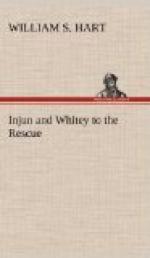Whitey, waiting behind the living-room door, had heard in bunk-house talk of these various ways in which the bad man proved himself an artist with his gun—had to prove himself one, if he wanted to remain alive. But when Mart Cooley, the most deadly man of that kind in the West, entered the living-room and faced the ranchmen, Whitey did not get his thrill—at first. For Mart was not a very large, nor a very fierce-looking person, as he stood sidewise to Whitey, and talked to the others.
Not often does crime fail to leave its mark on a man. The mouth, the chin, the forehead; some feature usually shows traces of it. And when Mart Cooley turned and Whitey saw his eyes, he got his thrill. They were a hard, light, steely gray, and they looked out from lowered lids, oh, so steadily. Months of brooding in the prison had helped to harden Mart’s eyes, that had needed no help in that way; brooding over imaginary wrongs, for he thought his arrest an injustice. Other men had stolen a few cows, and got away with them, but Mart was made to suffer, and came to think himself a victim.
Out in the barren waste of the Chinook Country, lonely and gloomy, Mart had planned vengeance. But against whom? No one man could fight the Government. Failure was sure to come, and it meant death or worse—further imprisonment. In time Mart had come to regard all humanity as his enemy. Thus does crime and solitude twist the mind of man. Mart was ripe for a killing. And these men were offering him a chance.
CHAPTER XV
THE CATTLE-SHEEP WAR
Next morning before dawn a determined and desperate band of men rode from the Star Circle Ranch, under the leadership of Mart Cooley. Whitey and Injun were wise enough not to show themselves, Whitey fearing not only that they would be forbidden to go, but that they would be sent home. This would be mortifying, to say the least. But if he were not forbidden—well, we all know the kinds of excuses with which we ease our consciences.
While this was going on in Whitey’s mind, Bill Jordan was sleeping at the Bar O. But had Bill known whither his joke on Whitey was leading the boys, it is likely that he would not have slumbered so peacefully.
So they waited until the warlike expedition had disappeared on the rolling prairie, and then they followed at a distance. And that was easy, for Injun could have tracked that mass of horses’ hoofprints in his sleep.
Most of the time Injun and Whitey were out of sight of the cattlemen. So in order to make this story run right along, it is necessary to tell what happened to the men while the boys were absent, all of which Injun and Whitey heard about afterwards.
It was well along in the forenoon when in the distance a mass of moving dots, with moving specks on its outskirts, indicated a flock of sheep, and spurring their horses to a gallop the men dashed toward it. And I regret to say that when the flock was reached, the gallop did not end. The men rode straight through that bleating, panic-stricken mass, on the edge of which two hysterical collies vainly tried to exert control of their charges. The cattlemen were looking for the shepherd.




